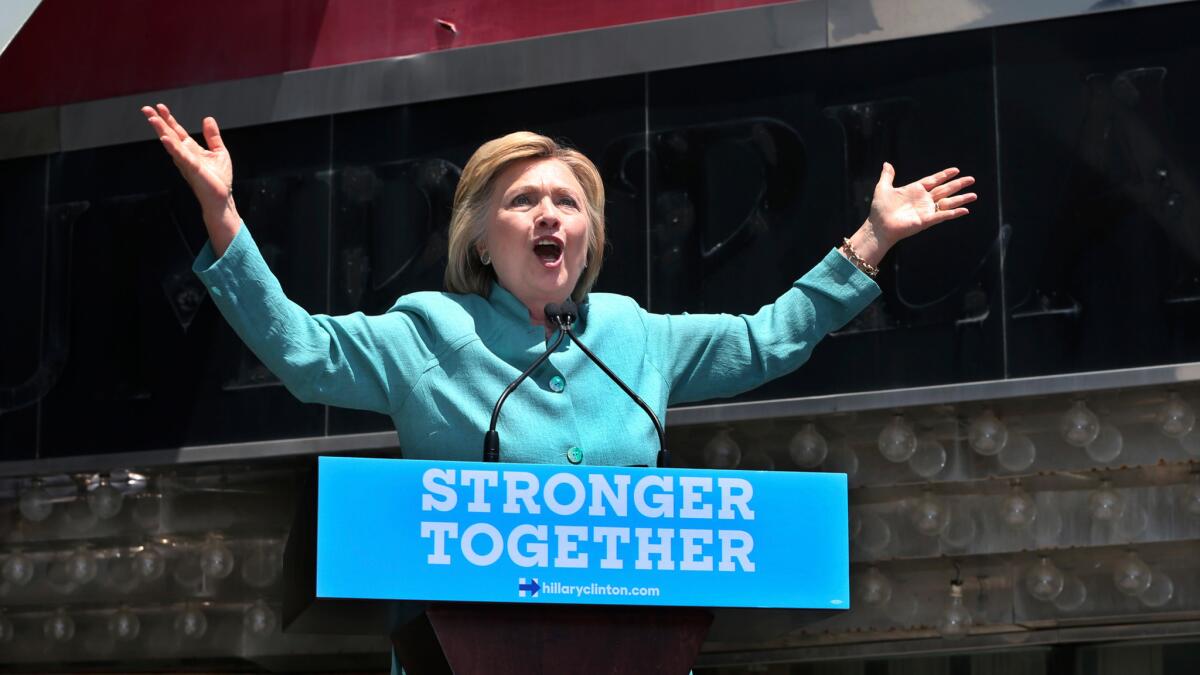Op-Ed: Hillary Clinton got the political insider treatment, and that’s a problem

- Share via
Although Hillary Clinton was “extremely careless” when she mishandled classified information on her private email server, no reasonable prosecutor would bring criminal charges against her, FBI Director James B. Comey claimed Tuesday in a news conference. He cited a dearth of evidence proving criminal intent, and argued that it was appropriate to consider “the context of a person’s actions and how similar situations have been handled.”
But even those who rooted for this outcome, whether out of support for the Democratic nominee or opposition to her Republican rival, should find the “context” of Clinton’s behavior damning, not exculpatory.
Her apparent intent in setting up a private server was to subvert the Freedom of Information Act and protect her communications from bureaucratic review, public scrutiny and political criticism. In other words, her reasons for jeopardizing classified secrets were wholly self-serving. And as she sought votes in the primaries, Clinton repeatedly misrepresented the nature of her behavior in numerous false statements.
Compare her motives to those of whistle-blowers such as Thomas Drake, Chelsea Manning and Edward Snowden, who broke rules governing classified information in order to expose government wrongdoing. The “context” for their rule-breaking was a post-9/11 national security environment in which state agencies engaged in numerous instances of unconstitutional behavior, from torture to mass spying on innocents. Yet they all faced or face decades in prison. (Manning has been confined to a cage since 2013.)
Only a longstanding member of the establishment like Comey could believe that Clinton’s selfish, careerist intent was more excusable, if not more elevated, than Drake, Manning and Snowden’s selfless and self-endangering behavior.
As for “how similar situations have been handled,” it’s true that members of the Washington insider club have, like Clinton, received the kid-glove treatment. Neither Leon Panetta, the former CIA director who revealed state secrets to a Hollywood director, nor John Brennan, who once revealed an undercover counter-terrorism operation during a news conference, nor David Petraeus, who revealed classified information to his mistress, permanently lost their security clearances.
What about ordinary citizens?
“Had someone who was obscure and unimportant and powerless done what Hillary Clinton did,” Glenn Greenwald wrote recently, “recklessly and secretly install a shoddy home server and worked with top secret information on it, then outright lied to the public about it when they were caught – they would have been criminally charged long ago, with little fuss or objection.”
Powerful insiders can simultaneously hide damaging information under “top secret” stamps and leak favorable information with impunity.
He’s right. Consider Bryan Nishimura, a Navy reservist from Folsom, Calif. While deployed in Afghanistan, he downloaded classified briefings onto personal electronic devices. Later, when FBI agents searched his home, they discovered that he was illegally storing state secrets, but there was no evidence that he intended to distribute them, according to the Associated Press. Nevertheless, he was prosecuted, convicted and sentenced to two years’ probation and a $7,500 fine. “Ordered to surrender his security clearance,” AP reported, “he is barred from seeking a future security clearance.”
The perverse disparities in the treatment of whistle-blowers and low-ranking soldiers, on one hand, and more prominent mishandlers of classified information, on the other, is a perhaps inevitable consequence of two factors: a system of state secrets so over-inclusive that it is routinely violated by well-meaning people with no intention of harming their country; and a high degree of prosecutorial discretion, predictably exercised in a way that protects those with power.
The fact that the political elite and the hoi polloi operate under different rules would be bad enough if it merely led to unfair outcomes in individual cases. These disparities, however, help determine the intelligence that makes its way to the public. Powerful insiders can simultaneously hide damaging information under “top secret” stamps and leak favorable information with impunity. Double standards also undermine confidence in the fairness of what the presumptive Republican nominee has taken to calling a “rigged system.”
Of course, as Bloomberg’s Megan McArdle pointed out, Donald Trump would offer no relief. “How many people are going to think that if Trump had been in Clinton’s place, he would have said: ‘Heavens no, we can’t go having a private server! That would be unethical and strictly against the rules! Put my emails on the State Department system so that it will be open to FOIA!’”
No matter who wins in November, the executive branch will exploit its wide discretion on this subject and the power it affords. It’s therefore Congress’ job to improve on the status quo by addressing over-classification, passing new protections for whistle-blowers and repealing the Espionage Act. A government with fewer official secrets could protect them more effectively and better retain legitimacy among its citizens while doing so.
Conor Friedersdorf is a contributing writer to Opinion, a staff writer at the Atlantic and founding editor of the Best of Journalism, a newsletter that curates exceptional nonfiction.
MORE FROM OPINION
James Comey outlines a persuasive case against indicting Clinton, but the decision isn’t his to make
Politics on parade: How Black Lives Matter halted a gay pride parade in Toronto
How a Trump-Gingrich ticket would play out
Follow the Opinion section on Twitter @latimesopinion or Facebook
More to Read
A cure for the common opinion
Get thought-provoking perspectives with our weekly newsletter.
You may occasionally receive promotional content from the Los Angeles Times.






